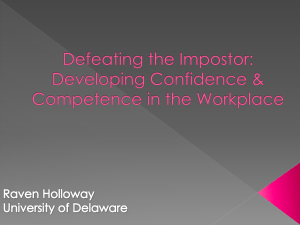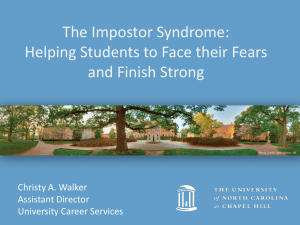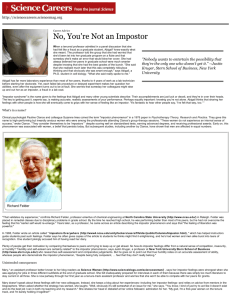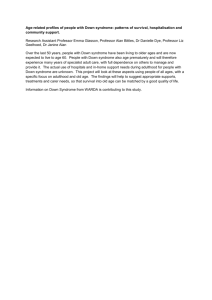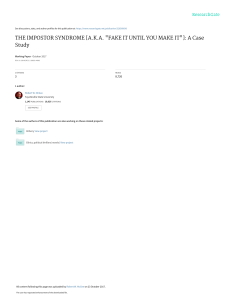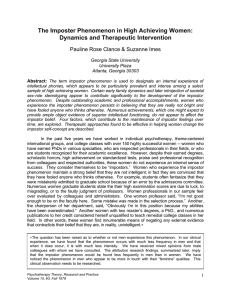FIGHT THE IMPOSTOR SYNDROME IMPROVE YOUR CONFIDENCE & CAREER Executive Coach
advertisement
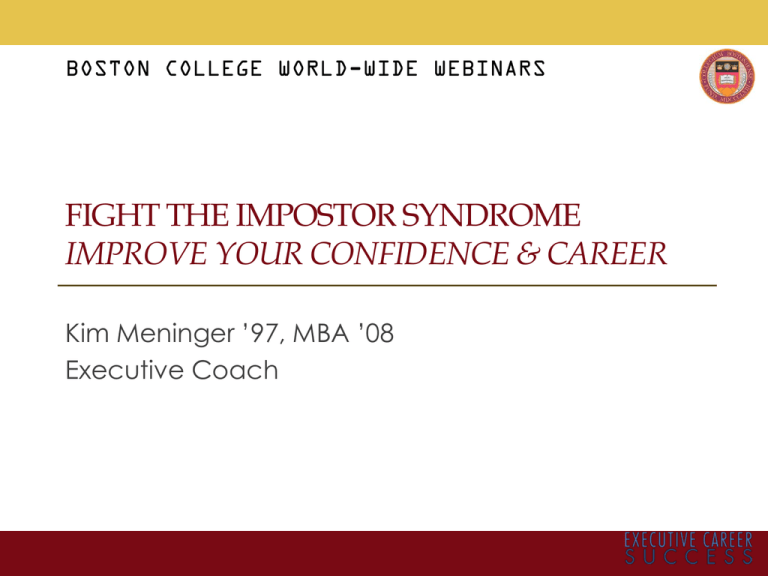
BOSTON COLLEGE WORLD-WIDE WEBINARS FIGHT THE IMPOSTOR SYNDROME IMPROVE YOUR CONFIDENCE & CAREER Kim Meninger ’97, MBA ’08 Executive Coach Agenda • What is the Impostor Syndrome? • What does it look like? • Why is it problematic? • Why does it happen? • What can you do about it? • Where can you find additional resources? Is This You? • I attribute my success to luck or timing, rather than • • • • my own skills and talents. I worry that others will find out that I’m not as competent or capable as they think I am. I’ve unknowingly deceived people into thinking I’m good enough for this job. I feel undeserving of my success. At any moment I will be exposed as a fraud. 3 Who Else Suffers? “I have written eleven books, but each time I think, ‘uh oh, they’re going to find out now. I’ve run a game on everybody, and they’re going to find me out.’ ” ~ Maya Angelou, Poet "There are an awful lot of people out there who think I'm an expert. How do these people believe all this about me? I'm so much aware of all the things I don't know.” ~ Margaret Chan, Chief of the World Health Organization “The exaggerated esteem in which my lifework is held makes me very ill at ease. I feel compelled to think of myself as an involuntary swindler.” ~ Albert Einstein 4 What Is the Impostor Syndrome? • Feelings of self-doubt, inadequacy and incompetence despite contradictory evidence • Most common among high achieving people • Commonly occurs at transition points • Affects both genders 5 What Does It Look Like? • A vicious cycle of anxiety and • • • • • short-term relief Fear of failure A strong need to be the best Perfectionism Unwillingness to internalize positive feedback Fear of success 6 Why Does It Matter? • Stress • Physical & Emotional Effects • Relationship Issues • Lack of personal & professional satisfaction • Unreached potential 7 How Did You Get Here? • Early family influences • Messages about success and failure • Myths and labels • First in your family • Decision to pursue an alternative path • Pressure to represent your group • Limited diversity • Unsupportive organizational cultures • Competition, hostility 8 What Can You Do? • Acknowledge the presence of the • • • • • • Impostor Syndrome Share your feelings with others Understand the roots of your feelings Own your success Accept external validation Leverage your resources Evaluate your environment 9 QUESTIONS? Additional Resources • The Impostor Phenomenon Overcoming the Fear that Haunts Your Success, Dr. Pauline Rose Clance • Secret Thoughts of Successful Women Why Capable People Suffer from the Impostor Syndrome and How to Thrive in Spite of It, Valerie Young • The Confidence Code The Science & Art of SelfAssurance – What Women Should Know, Katty Kay & Claire Shipman • The Empress Has No Clothes Conquering Self-Doubt to Embrace Success, Joyce M. Roche 11 Additional Online Resources Learning to Deal with the Impostor Syndrome New York Times, October 26, 2015 The Personality Traits that Make Us Feel Like Frauds Harvard Business Review, October 22, 2015 Feel Like a Fraud? American Psychological Association TED Talks|Your Body Language Shapes Who You Are Amy Cuddy, YouTube 12 Contact Me Have a question or comment? Need additional support? Visit: www.ExecutiveCareerSuccess.com Email: Kim@ExecutiveCareerSuccess.com Connect: www.LinkedIn.com/in/KimMeninger 13
